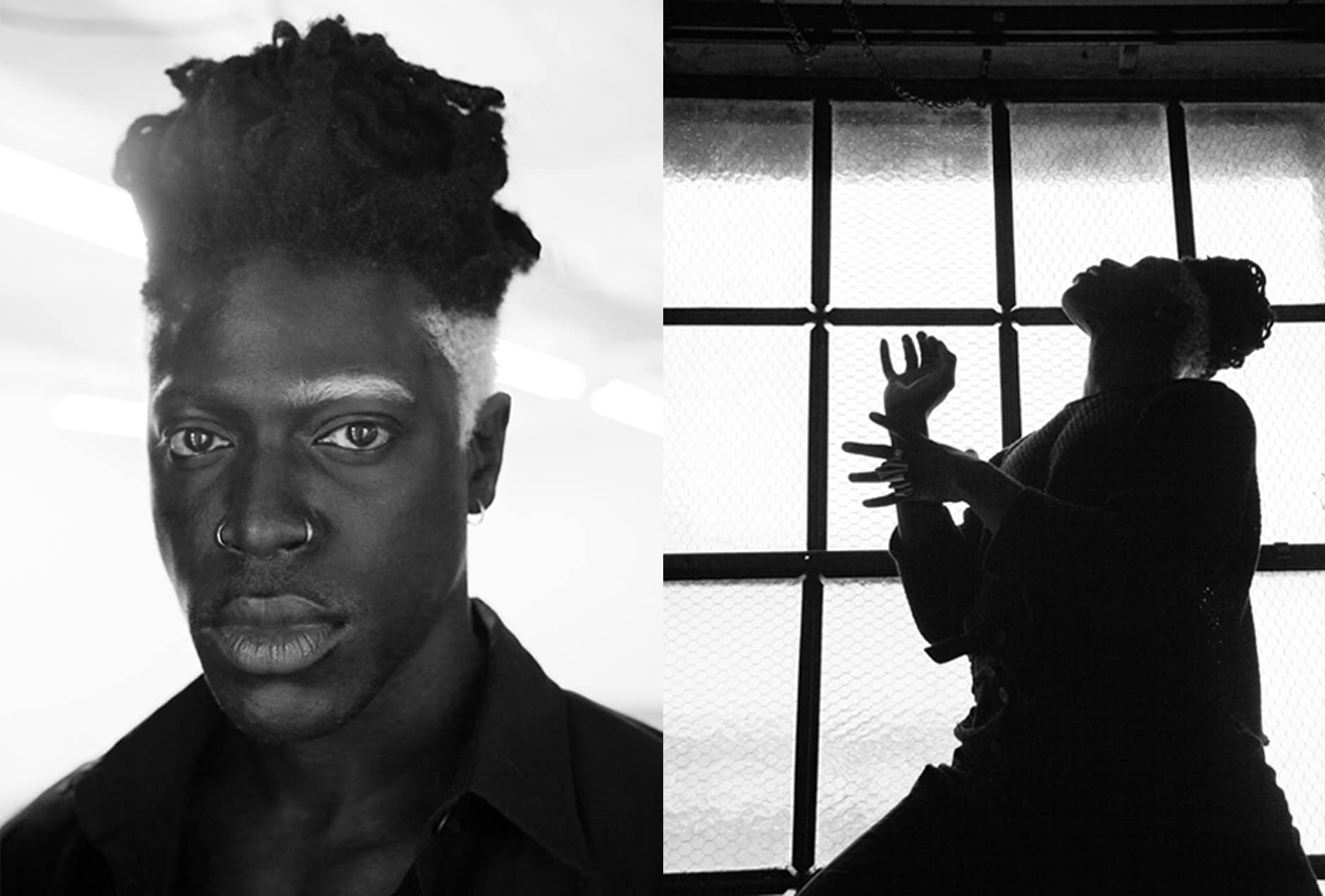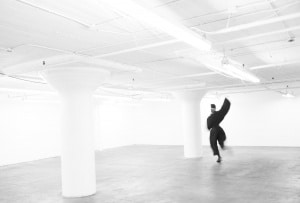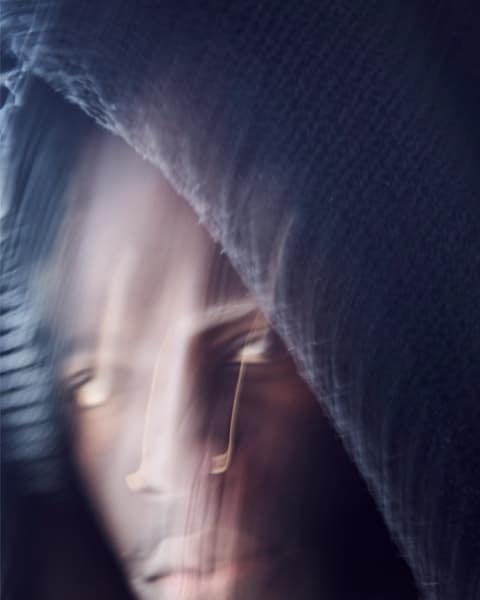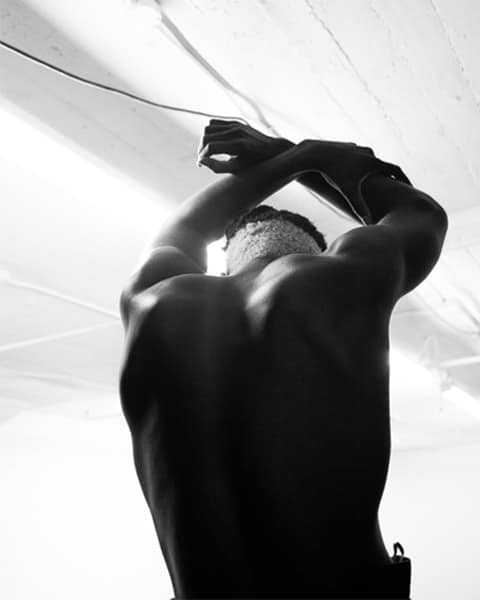
While most singers are clued in to the importance of image, it is a rare musician whose art wholly transcends their song. Moses Sumney is one of those artists. At the close of last year he wrote, directed, choreographed, styled, and starred in the music video for the first single from his forthcoming album. His vision shaping every stage of his creative output. And in the years since arriving fully formed on the Los Angeles music scene only half a decade ago, that artistry has seen him ushered from sold out concerts to the hallways of high fashion.
So by any measure, this next decade belongs to Sumney. Cornering the market on folk-inflected-soul with his previous record Aromanticism, his ambitious double album græ sees him careening through the spaces between rock, jazz, and avant-garde electronica. And it is that art in which he creates his comfort. Growing up between Ghana and California to migrant parents, he has only ever found solace in an intangible. “Art has always been home. Not to be cheesy. For me it has always been music. I always have my song book with me, and that’s home.”
Oliver Edwin: The opening lines of Virile, the first single from the new album, place you very firmly in Appalachia. And you officially moved to Asheville, North Carolina, while writing this new material. Has there been a difference in the way that town has felt like home compared to when you were living in L.A.?
Moses Sumney: Yeah, when I moved to L.A. I was kind of still a kid. I moved there for college. So even though I chose it, in a lot of ways because I was very much in a structure – first the university and second the music business – it always kind of felt like it wasn’t totally mine, or I didn’t have full and complete autonomy over my life. Having moved to a city that’s very much ‘off the grid’ as a full blown adult, it feels like the first time I’ve got to self-determine –
– and self-define.
Yes, I’ve kind of been able to redefine myself every time I’ve moved, because I moved when I was 10, and then I moved when I was 16 to L.A. And each time I was like, ‘This is who I’m going to be now.’ And this, for me, was the first time I could self-determine without having to redefine myself. Because the redefinition of self is kind of done for the sake of socialisation. Or you know, you’re thinking about how you’re going to be perceived, and shit like that. Or that’s what it’s been for me in the past.
This was the first time I was like, ‘Okay, all the things I’m redefining are going to be internal. I’m going to read more, I’m going to stay in my house more, I’m going to go on hikes. And it’s been more of a self-betterment journey. Also, I live in a house by myself for the first time, and I’m furnishing it. So I’m creating a home in a way that I never have been able to in the past.

Was there any social redefinition?
No. And the thing that I discovered, that I wasn’t sure of, is that I’m basically myself, always. Except the complication is that there are many different versions of myself. Maybe there was a time in my life during which who I am in L.A. was different from who I am in Asheville. But I realised that the way I perform socially, generally speaking, is more or less the same across the board the older I get. Which is a good sign to me, because it just means that I don’t care.
I ask about the socialisation aspect because in the openings of your early interviews there was a lot made of the famous people cosigning you, as a way of introduction to you as an artist. But I’m interested in the unknown people in your life, and Asheville must be full of those people.
That is such an interesting question. And something that no-one has really acknowledged before. That was a huge problem for me, and it still is in a lot of ways. But when I was coming up in L.A. after I’d left college there was a lot made in the press about all the famous people that were championing me. But there was this thing happening in my social life, where it was suddenly full of famous people, and suddenly some of my closest friends were famous, and suddenly the people I hung out with casually who weren’t close friends were famous. And it was weird because it was socialising me in a really negative way. And I didn’t realise it. But at the same time it felt genuine to me because I was like, ‘Oh my god, finally people who think about the world the way I do.’ Which kind of makes sense if you think about the ambition and the perspective on the world that it requires to enter, let’s call it, ‘public office’?
So in a way it felt like finally people got me. But at the same time, especially in L.A., people who are in the spotlight are socialised very negatively. And have very negative, dark, demonic habits. And so after a few years I found it quite depressing. Now, where I live, I don’t have any famous friends. It’s been a lifelong dream to move to a city where I don’t know anyone, and nobody knows who I am. And even though I had met people who lived in Asheville at some points, when I moved there I truly just genuinely did not have any friends. I didn’t know anyone to hang out with. So I’ve had to organically make friends.
And whereas all of my friends in Los Angeles were made through playing shows and venues and doing studio sessions, people who already knew who I was and worked in the industry, my friends in Asheville have been the guy who works at the market that I met randomly and asked if he knows where I can buy certain things in town. Or the guy that works at the restaurant. Or an engineer down the street who didn’t know who I was. That’s been really positive because I find that my conversations are about other shit, you know. And I feel like my mind is growing and expanding beyond just thinking about myself as a public entity when I’m with people.
That feels healthy too.
I think it’s much, much healthier. And where I live people don’t really care about fame. People see me sometimes and they’re like, ‘Oh yeah, good job.’ I mean one, most people don’t know who I am, but two, people don’t care. It’s just the South. They don’t care because there’s nothing you can do for them. It’s like, ‘Okay, you’re famous.’ Or almost famous, I don’t think of myself as famous. Or like, ‘Okay, you have a social media following. I still need to go to the farm today. I’m still going to sell my goat milk at the farmer’s market.’ Whereas in L.A. it’s like, ‘Oh my god, you’re famous. Maybe if I hang out with you I can be famous too.’
Coming back to Virile. It feels like a very complex analysis of masculinity, facades, and the inheritance of patriarchal systems between fathers and sons. A very necessary song for 2020. I wonder: what questions do you want to see asked of masculinity this decade?
That song is so personal. So it’s hard to think of it in societal terms. But it obviously is about society too. I think what I want to see asked of masculinity is, what do men have to contribute to society?
I think we’re talking a lot about what men have done to ruin the world, which I fully agree with. But I think it’s not complex enough, the kind of dialogue that has risen to the top of pop culture. And it might all not be positive, what men have to contribute. But let’s talk about what place masculinity has in society. Because we cannot pretend that we are all just aiming to get rid of it. I think that some people think that they want that. But one, I don’t think it’s possible. And two, I don’t think it’s realistic.
I’m interested in asking what the role of masculinity in society is. And what the role of femininity is. And how can they coexist? And that’s a better phrasing than ‘what can men contribute?’ Because it’s really about masculinity and masculine energy, which is present in both or all genders.

Culture has been toying with expressions of gender for a while now. But typically that has only been a privilege granted to androgynous men. Particularly skinny, white, androgynous men. Do you think society might be on the edge of exploring the subtleties within more stereotypical expressions of masculinity?
I don’t know if I fully agree with that assessment, it may be more complex. Depending on where you are in the world, the answer is different. The kind of androgyny we’re seeing in the media is very specific, and very class-specific also. In Ghana for example, there are a lot of men who are performing versions of masculinity that are not considered mainstream for the western world. If you think about traditional African dress, men essentially wear garments regularly that look like dresses. Or when I lived there, and this was before the internet made everything so globalised, it was not unusual for men to hold hands – who were just friends. Or for men to not be buff. And so in a way I think that the people that we see in popular culture are not emblematic of what’s actually happening ‘on the ground’.
You’ve been objectifying your body in the visuals for this album cycle. And I feel like that was something you were very cognisant of not doing in your previous release. Does that objectification tie into the exploration of these themes for you?
I think I’m interested in so many things right now and they all just kind of came to the surface with this record, it’ll be fascinating to see how people read it. On one end I’m interested in nudity. I think it’s so beautiful, objectively – nudity separated from sex. I see my own body in the artwork and I don’t think I’m selling sex. If people read it that way, I can’t control that, and that’s fine. On another end, the music is so naked, the lyrics are so intimate, that I reached a point where I realised that if I’m putting myself on the line then I need to put my actual body on the line too. Like, I’m putting my insides on the line, let me put my outsides on the line too. On another end, I never realised that I could be attractive to people. Or even to myself. And so finally, after the hundredth person over the course of my 20s was like, ‘No, you realise you’re attractive, right?’ I was like, ‘Wait a minute, I spent my whole life being ugly and now I’m hot? We need to take some pictures.’ Because that’s not gonna last.

Back around the time of your first EPs you talked a lot about being propelled into your career out of a fear that you were going to grow old or die without pushing yourself to try becoming a musician. Does that fear of death still push you today?
I will argue that everything we do is because we’re going to die. Controversial, but everything we make is ultimately because we’re going to die. We’re constantly aware of the extensional clock ticking, and so, let’s say yes, it’s ’cause I’m going to die.
The thesis of this album seems to me to be about the dissolution of binaries. Or in the words of the lyrics, the recognition of multiplicity. But you seem to me already to exist in the public eye as someone who resists definition. Do you think a part of that multiplicity, or resistance to definition, is that you feel vulnerable being known?
It’s not that I don’t want to be known, or that being known makes me uncomfortable, as it pertains to your question. The problem is that people are unable to know someone or understand someone without erasing aspects of their identity. Because in order to understand someone, especially artists, we need to be able to define them. And in order to define things easily we need to be able to put them in a box and say, ‘This is what it is.’ And that has been done to me so much over the course of my career that I’m like, ‘Damn, are y’all even listening?’
The most obvious one, and I’m always raging against it, is being called an R‘n’B artist.And I’m always like, ‘Are y’all listening with your eyes or your ears?’ Because this is not R‘n’B music. There are influences … It’s a mixture of a bunch of different things, and that is what my identity is. And so the machine I’m raging against is the idea that I have to be either one thing or another. And now that society is getting a little more complex it’s like, ‘Oh, so you’re both?’ And it’s like ‘No, it’s not that either!' It’s the space in between both. The space outside of both.
Read the full interview with Moses Sumney in RUSSH's Desire issue, out now.



